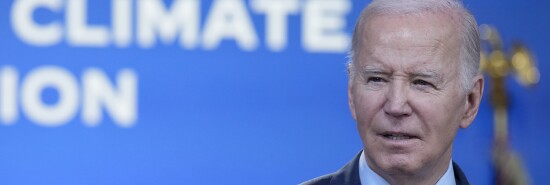
Here’s where Biden stands on his promise to end drilling on federal lands three years in
Breanne Deppisch
Video Embed
President Joe Biden has said he ran for office “to restore the soul of the nation, rebuild the middle class, and unite the country.” With 2024 looming, it’s time to take stock of other promises he has made while campaigning and in office. This Washington Examiner series, Oath of Office, will investigate whether Biden has kept up his end of the bargain. Part Two will examine his pledge to limit drilling for oil and gas on federal lands.
President Joe Biden campaigned for office in 2020 vowing to halt new drilling on federal lands.
Since taking office, Biden has followed through in part. He banned oil and gas drilling on millions of federal acres.
OATH OF OFFICE: DID BIDEN FULFILL HIS PROMISE TO RESTORE THE ECONOMY?
Still, some environmental groups say Biden has reneged on some of his core campaign promises, opting to prioritize energy security or lower costs at the expense of his goals on decarbonization, which could open him up to criticism as he runs for reelection in 2024. Republicans and the industry, meanwhile, say he hasn’t done enough to allow domestic production of oil and gas at a time of market volatility.
The context
On his first day in office, Biden instructed the Interior Department to halt all new oil and gas leasing in federal lands and waters pending a comprehensive review of the lease program.
But that “pause” subsequently encountered legal problems, culminating in a federal judge in Louisiana last year ruling that the Interior Department had violated federal law when it canceled the lease sales, saying they are required to be held under the Mineral Leasing Act and the Outer Continental Shelf Lands Act.
The administration has also been forced to carry out lease sales because of an Inflation Reduction Act provision negotiated by Sen. Joe Manchin (D-WV) that links offshore wind to oil and gas leasing. That provision was a major sticking point required to secure Manchin’s approval on the IRA.
More generally, geopolitical events and domestic policy priorities have prompted Biden to moderate or even backtrack on his promises regarding drilling.
Biden asked U.S. oil refiners and producers last year to take “immediate actions” to ramp up supply after Russia’s February 2022 invasion of Ukraine pushed U.S. gas prices to an all-time high of more than $5 per gallon. The U.S. also exported roughly 10 billion cubic feet per day of liquefied natural gas to the European Union in 2022 in an effort to help the bloc avert a winter energy supply crisis, a trend likely to continue in the years ahead after the administration approved new permits for LNG export facilities.
In March, the Biden administration approved the Willow Project, ConocoPhillips’s massive 600 million-barrel drilling project in Alaska. The decision sparked outrage from green groups, who accused Biden of backsliding on fundamental campaign trail promises.
Approving the Willow Project “will lock in decades of dirty and dangerous oil and gas production and drown out the tremendous environmental and economic opportunities available from transitioning to a clean economy,” Margie Alt, director of the advocacy coalition Climate Action Campaign, told the Washington Examiner shortly after the project’s approval.
But Biden has also made significant overtures to green groups as well.
In September, the Biden administration moved to block oil and gas drilling on millions of acres in Alaska’s North Slope and cancel seven Trump-era oil and gas leases in the area, helping ensure “maximum protection” for more than 40% of the National Petroleum Reserve.
That month, the Interior Department also published the most restrictive five-year plan for oil and gas leasing in U.S. history, which calls for just three oil and gas lease auctions to be held between 2023 and 2029.
CLICK HERE TO READ MORE FROM THE WASHINGTON EXAMINER
That’s far fewer than the 11 leases included in the previous five-year plan and the minimum number of lease sales the Interior Department is required to approve in order to comply with offshore wind targets under the Inflation Reduction Act.
Though the Interior Department stressed that the inclusion of lease sales in the program does not mean they will be carried out, the plan was still criticized roundly by environmental groups for going too far — and by Republicans for not going far enough.
